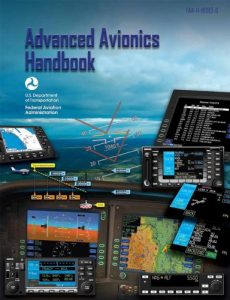The Advanced Avionics Handbook is a new publication designed to provide general aviation users with comprehensive information on advanced avionics equipment available in technically advanced aircraft. This handbook introduces the pilot to flight operations in aircraft with the latest integrated “glass cockpit” advanced avionics systems. The arrival of new technology to general aviation aircraft has generated noticeable changes in three areas: information, automation, and options. Advanced avionics systems can automatically perform many tasks that pilots and navigators previously did by hand. For example, an area navigation (RNAV) or flight management
system (FMS) unit accepts a list of points that define a flight route, and automatically performs most of the course, distance, time, and fuel calculations. Once en route, the FMS or RNAV unit can continually track the position of the aircraft with respect to the flight route, and display the course, time, and distance remaining to each point along the planned route. Chapters include: Introduction to Advanced Avionics; Electronic Flight Instruments; Navigation; Automated Flight Control; Information Systems; Essential Skills Checklist; Glossary
The Federal Aviation Administration (FAA) is an agency of the United States Department of Transportation with authority to regulate and oversee all aspects of civil aviation in the U.S. (National Airworthiness Authority). The Federal Aviation Act of 1958 created the group under the name "Federal Aviation Agency", and adopted its current name in 1967 when it became a part of the United States Department of Transportation. The Federal Aviation Administration's major roles include: Regulating U.S. commercial space transportation. Regulating air navigation facilities' geometry and Flight inspection standards. Encouraging and developing civil aeronautics, including new aviation technology. Issuing, suspending, or revoking pilot certificates. Regulating civil aviation to promote safety, especially through local offices called Flight Standards District Offices. Developing and operating a system of air traffic control and navigation for both civil and military aircraft. Researching and developing the National Airspace System and civil aeronautics. Developing and carrying out programs to control aircraft noise and other environmental effects of civil aviation.
system (FMS) unit accepts a list of points that define a flight route, and automatically performs most of the course, distance, time, and fuel calculations. Once en route, the FMS or RNAV unit can continually track the position of the aircraft with respect to the flight route, and display the course, time, and distance remaining to each point along the planned route. Chapters include: Introduction to Advanced Avionics; Electronic Flight Instruments; Navigation; Automated Flight Control; Information Systems; Essential Skills Checklist; Glossary
The Federal Aviation Administration (FAA) is an agency of the United States Department of Transportation with authority to regulate and oversee all aspects of civil aviation in the U.S. (National Airworthiness Authority). The Federal Aviation Act of 1958 created the group under the name "Federal Aviation Agency", and adopted its current name in 1967 when it became a part of the United States Department of Transportation. The Federal Aviation Administration's major roles include: Regulating U.S. commercial space transportation. Regulating air navigation facilities' geometry and Flight inspection standards. Encouraging and developing civil aeronautics, including new aviation technology. Issuing, suspending, or revoking pilot certificates. Regulating civil aviation to promote safety, especially through local offices called Flight Standards District Offices. Developing and operating a system of air traffic control and navigation for both civil and military aircraft. Researching and developing the National Airspace System and civil aeronautics. Developing and carrying out programs to control aircraft noise and other environmental effects of civil aviation.












